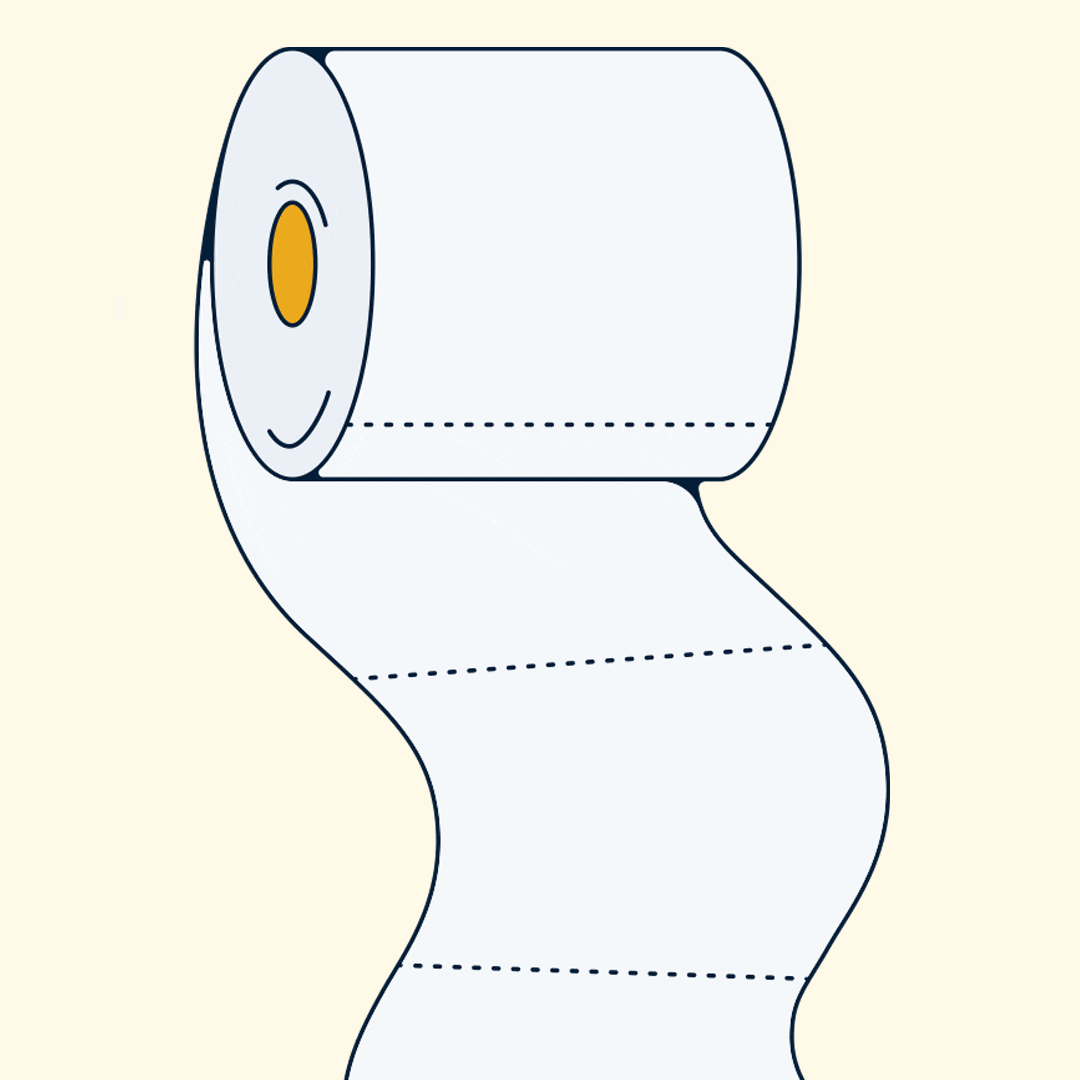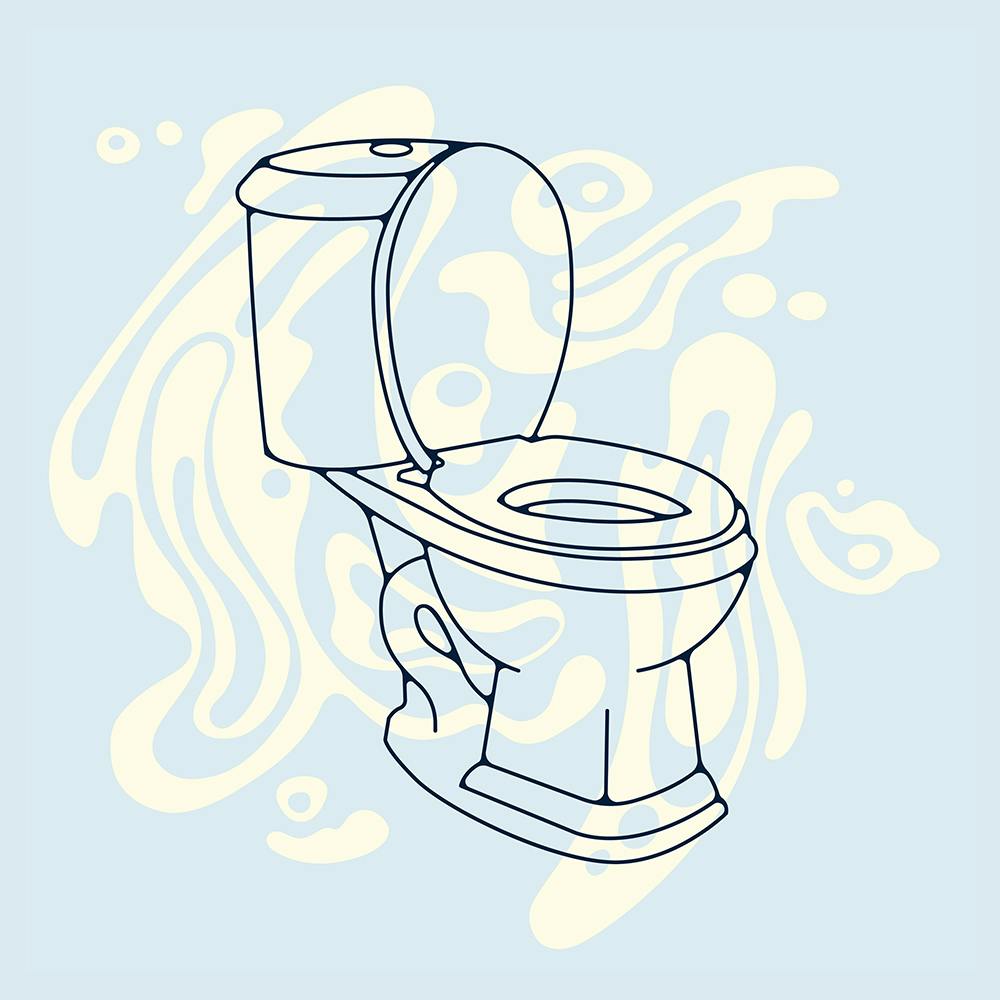Table of contents
1. When it comes to the physical symptoms of periods, cramps tend to get all the airtime. Almost no one wants to talk about one of the most annoying byproducts of the menstrual cycle: period poo.
2. What causes period constipation?
3. What causes diarrhoea before your period?
4. How to prevent period constipation and diarrhoea
5. Natural period constipation relief
Illustrated by Erin Rommel
When it comes to the physical symptoms of periods, cramps tend to get all the airtime. Almost no one wants to talk about one of the most annoying byproducts of the menstrual cycle: period poo.
Of all the physiological changes we go through every month because of our period, period poop is one that often gets overlooked.
Chances are that you’ve never made the connection – or dismissed it as a cruel coincidence – but there’s an actual biological reason why your bowels go on the fritz when you’re due on.
Is period poo normal?
Before your period, experiencing constipation, diarrhoea, or a double whammy is a common occurrence for many. Thought you were the only one? Think again.
While it’s not the sexiest subject, it’s an important one. Bowel health says a lot about your overall health, not to mention your quality of life. It’s one of those things that is overlooked until a problem arises, but understanding bathroom habits is vital – especially when it comes in relationship to your menstrual cycle.
How your bowels and menstrual cycle are linked
Hormonal fluctuations during your cycle don’t just have an impact on when you bleed and how moody you feel – they affect every system in your body, including your digestive system and bowels.
We still don’t know exactly why hormones affect the GI tract, but we know that this tract’s lining contains hormone receptors that are especially sensitive to sex hormones (like progesterone and oestrogen).
These receptors interact with hormones (which are in a constant state of motion throughout your cycle) and respond by regulating body functions – like bowel movements.
Underlying health conditions can be made worse
If you have underlying health conditions (like endometriosis or IBS), bowel issues might be common throughout a regular month, but your symptoms can flare up more when you’re due on. In fact, women with IBS are more likely to experience bowel disturbances during their period compared to women without any chronic digestive issues.

What causes period constipation?
If you ever feel constipated during your luteal phase, you can probably blame progesterone for your poo going MIA.
About a week before your period, progesterone levels peak to sustain a possible pregnancy, then drop rapidly if an egg has not implanted. It’s believed that a spike in progesterone is the culprit for an onset of PMS symptoms, including period bloating and constipation.
Progesterone acts as a muscle relaxant and decreases contractions in the bowel. Everything slows down, so gas and food takes longer to travel through your intestines, making you feel backed up and gassy. Higher levels of progesterone can cause water retention, which also makes going to the bathroom more challenging.
To make matters worse, many of us tend to reach for highly-processed, fatty, and carb-heavy comfort foods when we’re PMSing. That doesn’t exactly help an already sluggish digestive system.
What causes diarrhoea before your period?
Aside from constipation, another common pre-period digestive woe is diarrhoea. As if bleeding out of your vagina wasn’t enough, your body decides to give you the runs as well.
Two factors are likely at play. One of them are hormone-like chemicals called prostaglandins, which stimulate smooth muscle. If an egg isn’t fertilised – and a pregnancy doesn’t happen – your uterus starts producing more prostaglandins in order to contract and shed its lining (hello, cramps!).
If your uterus produces more prostaglandins than necessary, these can enter your bloodstream and make their way to the neighbouring smooth muscle in your bowels. There, they have the same contractive affect as they do in your uterus (more prostaglandins = more poo).
Both uterine and bowel contractions are caused by this surge in prostaglandins, which can make it hard to tell where cramps are coming from… it’s like a party in front and in the back.
Progesterone level drops may also be to blame
A sudden bout of the runs could also be caused by the fact that right before your period comes, progesterone levels drop dramatically.
That means your bowels can start contracting more, speeding things up again. All the poo that was backed up while you were constipated is suddenly in a rush to leave your body posthaste. Once again, more poo.
How to prevent period constipation and diarrhoea
These cyclical digestive issues can’t really be prevented unless you’re on a form of hormonal contraception. Some oral contraceptive users can avoid some of these symptoms with methods like the combined oral contraceptive pill. This releases a steady dose of oestrogen and progesterone throughout the month, helping to avoid the hormonal fluctuations that trigger period poo.
However, you can still experience GI distress if you take the pill-free break. While we wouldn’t recommend taking hormonal contraception willy-nilly simply to avoid a bit of constipation, it’s worth chatting to your doctor about.
Natural period constipation relief
Luckily, there are some things you can do to alleviate symptoms – without relying on hormonal contraception.
Increase fibre and water intake
If you’re more prone to feeling backed up before your period, you can offset some of constipation by upping your intake of high-fibre foods and water intake mid-cycle (when progesterone starts rising). A healthier diet can do wonders for your period, PMT, and PMS symptoms
Start moving
If you can, get your body moving. You don’t have to go for a full-on, bootcamp-style HIIT class. Light exercise is very effective in relieving constipation and trapped wind.
De-stress whenever possible
Stress and anxiety can exacerbate diarrhoea and cramping. When you’re stressed, your brain sends chemical signals to your gut, which can respond by, well, freaking out. Deep-breathing exercises, yoga, and meditation are great ways to lower stress rates.
Cut back on caffeine intake
If the arrival of your period gives you the runs, try cutting back on how much coffee you drink (I know, sorry) since caffeine is a natural laxative. The same goes for artificial sweeteners like sorbitol.
Laxatives as a last resort
If you’re really stuck, a gentle over-the-counter laxative or stool softener might be necessary. Don’t make this a habit though, as laxatives can irritate the stomach lining, which is no bueno for your gut microbiome if taken too often. If you become reliant on the, it can actually worsen constipation in the long run.
Monitor your poo habits
Just like tracking your cycle can help you understand and anticipate period symptoms, monitoring your bathroom habits can help avoid certain bowel discomfort.
A good idea is also to keep a journal (although we understand if you can’t be bothered to do that). Keeping a running track of symptoms based on where you are in your cycle can help you recognise patterns and preemptively plan ahead.
But mostly? Wait it out. Hormonal fluctuations may be frustratingly regular, but they’re also temporary. Be kind to yourself and take it easy on days when your bowels are being a pain in the ass (literally).
TL;DR
- Period poop is normal, from constipation to diarrhoea.
- Period constipation is caused by a spike in progesterone, which slows down digestion and stool from passing through your bowel.
- Period diarrhoea is caused by the production of prostaglandins, which cause cramping in both your uterus and bowels.
- Monitoring your bathroom habits during your cycle can help you predict any bowel issues. This will allow you to make lifestyle and diet changes to offset some of the most distressing symptoms and discomfort.






